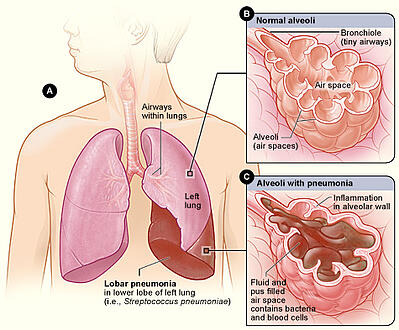
Exposure to harmful environmental pollutants or long term cigarette use is the cause for the majority of chronic obstructive pulmonary disease diagnosis's.
COPD is a lung disease that includes both emphysema and chronic bronchitis, which effects a persons ability to breathe regularly at times of rest and especially during times of peak physical activity.
In addition to COPD there are many other complications that come along with the diagnosis, one of the most dangerous is pneumonia.
Airways thin due to COPD which makes expelling mucus from the lungs difficult, when the airways thin they trap mucus which becomes an ideal breeding ground for germs that cause pneumonia. This risk is greatly increased if you are still a current smoker.
Defining Pneumonia
Pneumonia is a lung infection that can occur at any age, and it can be picked up from school, work, or just about anywhere.
Pneumonia is simply not one infection, it actually describes over 30 different infections stemming from numerous types of bacteria, viruses, inhaled particles or liquid.
If you have pneumonia you may notice a fever, cough, and worst of all if you are a patient with COPD is increased difficulty breathing.
The reason being is pneumonia reduces the amount oxygen present in the body.
When cells are not receiving an appropriate amount of oxygen then they begin to die, leaving the lungs and body prone to even further infections.
If not treated quickly then life threatening complications can arise in patients with COPD.
When discussing pneumonia there are two categories:
Bacterial Pneumonia: This can affect anyone of any age, and usually occurs after illness or when a patient has a weakened immune system from COPD. This is usually treated with antibiotics and plenty of rest.
Viral Pneumonia: Respiratory viruses can be the cause for pneumonia, especially in children or the elderly. Viral pneumonia is usually less sever than bacterial pneumonia, and is usually treated with rest.
If you are a patient with COPD then you are automatically more likely of developing pneumonia.
Pneumonia is more common for patients because these infections thrive when the lung are already weakened, as well as when the immune system is damaged, or when airborne bacteria is not filtered adequately.
Signs of Pneumonia in COPD Patients Include:
- Increased Difficulty Breathing
- Nausea
- Increased Chest Pain when Coughing
- Rapid Heart Rate
- Problems with Weight
- Coughing up Dark Yellow, Brown, or Mucus with Blood (More than usual)
- Frequent Shallow Breathing
- Chills
If you are experiencing any of the above symptoms then speak with your doctor immediately so they can begin tests to see if these symptoms are signs of pneumonia.
Treating Pneumonia
Symptoms of pneumonia can take as little as 1-3 or up to 7-10 to become recognized, so if you suffer from any of the previous symptoms or notice an overall increase of symptoms then speak with your doctor and get tested immediately.
In older patients with COPD the infection can take any where between 6-8 weeks and even longer to be fully treated.
Treatment options strictly depend on whether the infection is viral or bacterial pneumonia.
After tests have confirmed you have bacterial pneumonia then your doctor will prescribe you antibiotics, be sure to take the EXACT amount as well as for the allotted time.
Stopping antibiotics before told to can lead to pneumonia returning, often worse than before.
If the tests confirm you have viral pneumonia then your doctor may prescribe you antiviral medications, but will ultimately tell you to stay in bed and rest.
If you are prescribed medical grade oxygen then you may be using it more during the recovery from pneumonia.
The ultimate defense from pneumonia especially if you have a lung disease such as COPD where your immune system is already weak, would be to make sure you get a yearly pneumonia vaccination.
A yearly flu vaccination is another tool in your fight against pneumonia, because the common flu virus can easily turn into pneumonia in patients with COPD.
+Caleb Umstead



